Hamburg Report Highlights Iran Buying ‘Proliferation’ Equipment
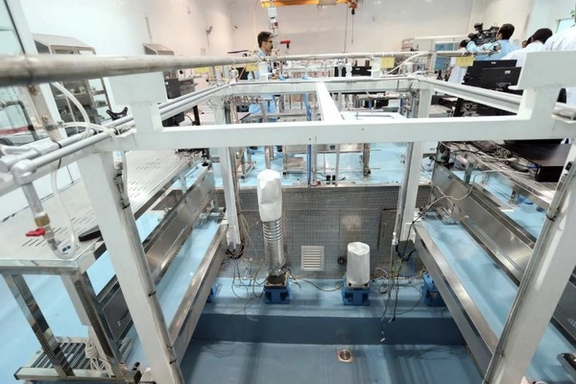
The Jerusalem Post Monday cited an annual security report by Hamburg highlighting September’s arrest of a man for exporting equipment to Iran without licenses.

The Jerusalem Post Monday cited an annual security report by Hamburg highlighting September’s arrest of a man for exporting equipment to Iran without licenses.
The man, named only as ‘Alexander J’ due to German privacy laws, allegedly between 2018 and 2020 sold Iran laboratory equipment, including four spectrometers, that required special licenses and was worth nearly 1 million Euros.
The Hamburg report said two alleged accomplices were still sought, and listed the case under ‘proliferation,’ which it defined as “the procurement of products for the production of nuclear, biological and chemical weapons of mass destruction and the corresponding carrier technology (rocket technology), including the know-how required for this."
Iran's regime is mentioned 82 times in the 194-page Hamburg report that focuses on a wide range of security threats to Hamburg's democracy.
At the time of Alexander J’s arrest in September, German police searched offices and apartments in 11 separate locations, across three German states – Hamburg, Schleswig-Holstein and North Rhine-Westphalia.
A report last year from the Washington-based Institute for Science and International Security (Isis) said the case reflected “the continued effort of Iran to break trade control laws and sanctions of other nations to procure items for its nuclear and ballistic missile programs.” Isis said Iran had in the Alexander J case not sought permits required under the terms of the 2015 Iran nuclear deal for equipment that “could contribute to sensitive activities, including enrichment-related activities, reprocessing or heavy-water-related activities.”
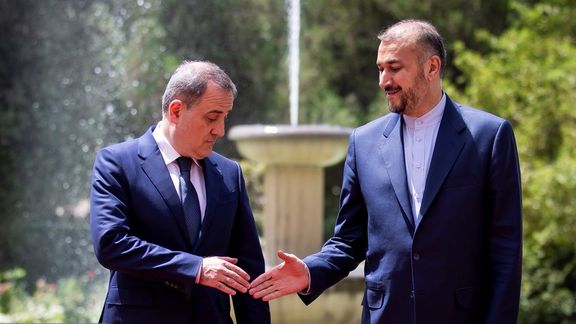
Foreign ministers of Iran, Azerbaijan, and Turkey are to meet in Tehran soon in a regional format, Iran’s foreign minister announced on Monday.
Hossein Amir-Abdollahian made the announcement at a joint press conference with his Azerbaijani counterpart Jeyhun Bayramov who arrived in Tehran for an official visit Monday.
Iran’s top diplomat also said that high-level experts from Azerbaijan, Armenia, Georgia, Russia, Iran, and Turkey will also be meeting soon in the '3+3' format and their meeting will be followed by a meeting of the foreign ministers of these countries in Tehran or another Iranian city.
The dates of the two summits, as well as Azerbaijani President Ilham Aliyev's planned visit to Tehran, are to be decided during the Azerbaijani foreign minister’s visit, Turkey’s official news agency Anadolou reported Monday.
Bayramov said at the press conference that Baku supports Iran's suggested formats, including the 3+3 format, for the summits.
During the press conference, Amir-Abdollahian said “misunderstandings” between Tehran and Baku have cleared up in the past ten months.
Tensions rose between Iran and its northwestern neighbor in September 2021 after Azerbaijan's arrest of Iranian truck drivers and its joint military drills with Turkey and Pakistan, which began September 12 in Baku, about 500km from the Iranian border. This was followed by Iranian military exercises near the Azeri border.
Tehran also has serious concerns over growing relation between Baku and Tel Aviv in recent years. Israel is one of Baku’s major oil customers and has reportedly been allowed to use Azerbaijan’s airbases. The topic was not brought up in the press conference Monday.
The Iranian foreign minister stressed the importance of territorial integrity of Azerbaijan and added that Tehran “reaffirms its support for the peaceful settlement of the ongoing Karabakh conflict based on the well-known principles of the international law."
“We are prepared as before to continue our support and assistance in this regard, so that the remaining issues [between Azerbaijan and Armenia] would be resolved on the basis of respect for the territorial integrity and sovereignty of the involved parties and through political dialogue,” he said.
Armenian Prime Minister Nikol Pashinyan and Azeri President Ilham Aliyev announced last month that the two countries will set up border security and delimitation commissions to settle their decades-long conflict over the Nagorno-Karabakh region.
Amir-Abdollahian described energy and transit as "two key areas of cooperation" between Tehran and Baku and said the two sides will sign their final agreement on power swap during Iranian Energy Minister Ali Akbar Mehrabian’s upcoming visit to Baku while his Azeri counterpart told reporters that the volume of trade between Tehran and Baku increased by 30 percent in 2021 but could still grow more.
According to Azerbaijan’s Apa TV, Bayramov also met with the Iranian President Ebrahim Raisi and discussed joint projects in the fields of energy and transport and emphasized the importance of creating new transport links between Azerbaijan’s East Zangezur economic region and the Nakhchivan Autonomous Republic through Iran as part of the north-south transit corridor.
The settlement of the conflict and delimitation of their borders has huge impacts on Iran’s northwestern transit roads and trade. Iran’s border with Azerbaijan increased by 132-kilometer after Azerbaijan’s victory against Armenia in the Nagorno-Karabakh War and a Russian-brokered deal between Azerbaijan and Armenia in November 2020.
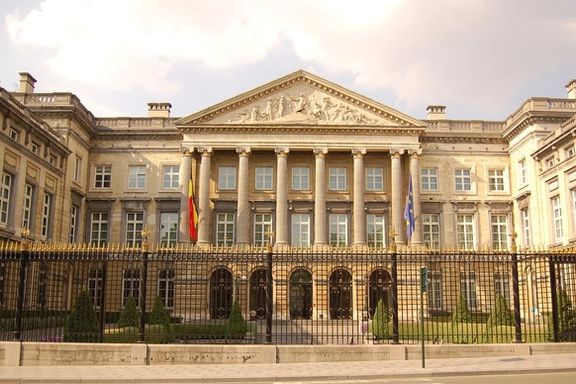
Numerous people and groups from around the world have warned about a prisoner exchange treaty between Belgium and Iran, pending approval at the Belgian parliament.
In a Monday statement on the eve of the parliament session to review the bill, more than 430 Iranian activists warned Belgian politicians against “giving the green light to state terrorism," demanding that the bill be abandoned.
The signatories noted that in case parliament approves the bill, the possibility of exchanging convicts will enable the Iranian government to continue abductions, hostage-taking and terrorist activities in Europe and elsewhere.
The draft law proposed by the Belgian government to the parliament could put the seal of approval on an agreement with Iran, which could lead to the release of Assadollah Assadi, an Iranian diplomat serving a 20-year prison sentence in Belgium for “attempted murder and involvement in terrorism” for his role plotting to bomb a gathering of the exiled opposition group Mujahedin-e Khalq Organization (MEK) near Paris in 2018.
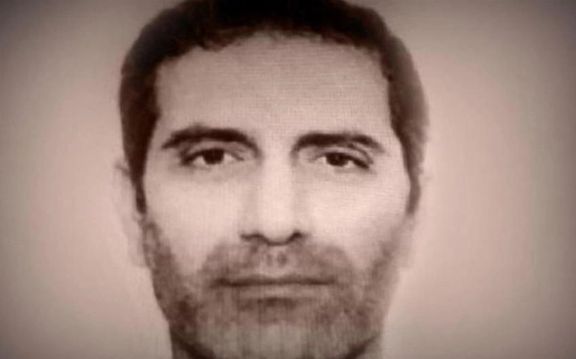
Earlier on Monday, a group of Iranians held a rally in Vienna to protest the possible extradition of Assadi to Iran.
Moreover, several former senior members of the US law enforcement and national security community, including former FBI Director Louis Freeh and some former US military commanders, sent a letter to the Belgian parliament urging rejection of the bill.
“This pending treaty is totally disrespectful to the law enforcement officers who risked their lives to prevent the 2018 attack. It also frustrates the judicial system’s ability to fulfill its mission to protect the citizens of Europe by denying it the ability to make perpetrators accountable,” read the letter, seen by POLITICO.
The authors warned that the treaty would effectively establish Belgium as a “sanctuary country” for terrorist operations, and a haven for Iranian intelligence services to maintain a European command center.
Three Republican US congressmen — Randy K. Weber and Louie Gohmert of Texas, and Brian Fitzpatrick of Pennsylvania — have also written a letter to Belgian Prime Minister Alexander De Croo calling on him to oppose the treaty. The lawmakers praised Belgian authorities for “preventing a heinous tragedy” by foiling Assadi’s “dastardly plot,” which they noted was carried out under the “ploy of diplomatic immunity.”
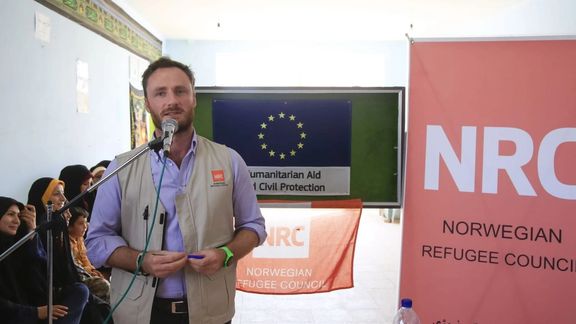
Also on Monday, Iran International broke the news that Tehran has detained a Belgian aid worker, identified as Olivier Vandecasteele, 41, since March, another example of the often-used Iranian tactic of imprisoning foreigners as hostages to exchange them with certain Iranians jailed in Western countries. He has served in various international humanitarian organizations since at least 2006, including, Médecins du Monde, Norwegian Refugee Council (NRC), and Relief International.
On July 2, an informed source had told Iran International that at least two Belgian citizens are currently in prison in Iran. One of the two is apparently an Iranian-Belgian professor from Leuven University, but the identity of the second prisoner was unclear until further investigation revealed it was Olivier Vandecasteele.
Following the controversy, the spokesman of the Belgian Federal public service of Justice, Edward Landtsheere told Iran International on Sunday that the bill on exchange of convicts is not intended for a specific person, but critics say it could end in repatriating the convicted former diplomat to Iran where he will most probably go free.
Although some activists, such as Oxford-based human rights lawyer Kaveh Moussavi, are of the opinion that the bill will not lead to Asadi’s.,release because such a move will be against a dozen international treaties to combat terrorism, there are Belgian politicians, such as representatives Theo Francken, Michael Freilich and Darya Safai who have warned of the dangers of the deal.
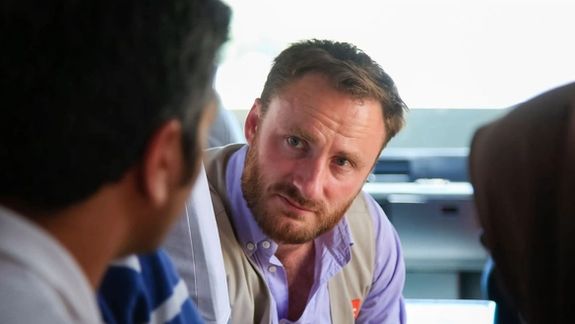
As the Belgian parliament takes up a law allowing exchange of convicts, Iran International has learned that Tehran has jailed a Belgian aid worker since February.
The detention could be another example of the often-used Iranian tactic of imprisoning foreigners as hostages to exchange them with certain Iranians jailed in Western countries.
A draft law proposed by the Belgian government to the parliament could put the seal of approval on an agreement with Iran, which could lead to the release of Assadollah Assadi, an Iranian diplomat serving a 20-year prison sentence in Belgium for planning a terror attack in Paris 4 years ago.
Iran’s security forces have detained Olivier Vandecasteele, 41, an aid worker who has served in various international humanitarian organizations since at least 2006, including, Médecins du Monde, Norwegian Refugee Council (NRC), and Relief International.
Vandecasteele worked in India, Afghanistan, and Mali and later became the director of NRC’s Iran operations in 2015 and assumed the same position with Relief International in Iran in 2020. He played an important role during the height of the Covid pandemic in Iran, distributing humanitarian aid throughout the country.
In July 2021, Relief International ended its relationship with Vandecasteele. In an email to Iran International, Relief International said it is not aware of Vandecasteele’s detention in Iran, despite information at our disposal showing that officials of the aid organization were informed of his arrest.
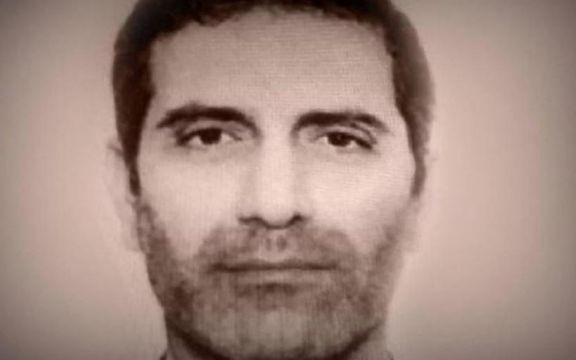
On July 2, an informed source had told Iran International that at least two Belgian citizens are currently in prison in Iran. One of the two is apparently an Iranian-Belgian professor from Leuven University, but the identity of the second prisoner was unclear until further investigation revealed it was Olivier Vandecasteele.
In what appeared to be internal organizational issues, he was put aside as a manager of Relief International last year and he returned to Europe. But an informed source told Iran International’s Fardad Farahzad that this could have resulted from pressures by Iran’s interior ministry’s foreign citizens’ bureau.
Vandecasteele, however, later returned to Iran on a tourist visa to visit a friend. It is possible that his return to Iran was an arranged trap by Iranian intelligence to detain and exchange him with Assadi.
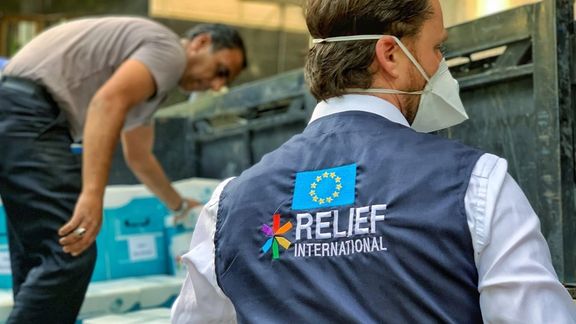
The agreement to allow Iranian convicts serving their prison terms in Belgium to return to Iran and presumably serve their remaining sentences there has now opened a real chance that Assadi, convicted of terrorism, will be allowed to go back and be received as a hero, as some Belgian media and politicians have pointed out.
It is unclear if strong objections to the government bill by foreign figures, the opposition and other lawmakers in Belgium will stop its approval. A parliamentary committee is set to start debating the bill on July 5.
In a letter to president of the Belgian Chamber of Representatives Eliane Tillieux, Former FBI Director Louis J. Freeh, former National Security Advisor James L. Jones and seven other US dignitaries denounced the proposed Belgian-Iranian prisoner transfer treaty.
In a video message Friday, Darya Safai, a member of the Belgian Parliament of Iranian descent, protested to the government’s decision to rush a prisoner exchange treaty with Iran.
Safai told Iran International that the bill does not exclude those in prison for terrorist activities and will pave the way for the release of Iranians involved in terrorism in Belgium. “My life and that of my husband, children, and so many others are in danger.”
Another Belgian lawmaker, Michael Freilich, has also questioned the government's “urgent” prisoner exchange plans. “Why does this all have to be so fast?” he asked the Parliament. “I strongly oppose any deal to release convicted terrorists from jail.”
Relief International was established by an American-Iranian, Farshad Rastegar, after the devastating Bam earthquake in Iran that killed 26,000 people on December 26, 2003.
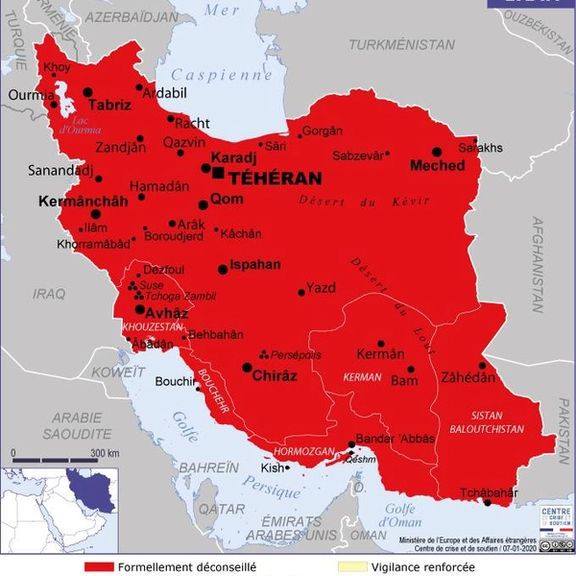
The French foreign ministry has warned French citizens and dual nationals against traveling to Iran due to the risk of arbitrary detention and unfair trial.
The ministry categorized the Iranian territory as “red” on its travel advisory map on Monday which means it formally advised French and dual nationals against going to Iran regardless of the reason.
It also urged French nationals visiting the country now to be highly vigilant and to take the necessary precautions to ensure their safety. “They are strongly advised to limit their movements within the country, to imperatively avoid any type of gathering and to make themselves known to the French Embassy in Tehran,” the notice said.
The ministry said the French – including people making a simple tourist visit -- are exposed to a high risk of arrest, arbitrary detention and unfair trial, adding that “in the event of arrest or detention, respect for fundamental rights and personal security are not guaranteed.”
It added that the ability of the French Embassy in Tehran to provide consular protection for nationals arrested or detained in Iran is very limited, and in the case of French-Iranian nationals, consular visits are not authorized as Iran does not recognize dual nationality.
In June, Sweden and Canada also advised their citizens against all travel to the Islamic Republic due to security risks to foreigners as well as the volatile security situation and the regional threat of terrorism.
In the past decade, Iran's Revolutionary Guards have arrested dozens of dual nationals and foreigners, mostly on unproven allegations of espionage in what human rights organizations have said is essentially hostage taking.
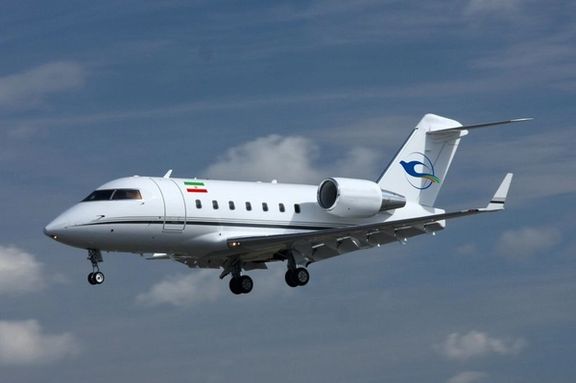
An Iranian airplane, operated by Pouya Air, was not allowed to land at Erbil International Airport on Monday, the airport’s director told to Iran International.
Ahmed Hoshyar said on Monday that the airport prevented the unauthorized cargo plane -- en route from Iran’s northwestern city of Orumiyeh – because it had not provided details about its crew, cargo and time of arrival.
According to Hoshyar, Iranian authorities had been informed about the necessary protocols before landing, including having a representative and renting an office at the airport as well as providing necessary data about the plane.
Pouya Air contacted Erbil’s authorities about the flight four days ago, but the company failed to fulfill the protocols, he said, adding that “the plane did not have any of the requirements needed for landing.”
Pouya Air is identified as an alias for Iranian airline Yas Air, under US terrorism sanctions since March 2012 for acting on behalf of Iran’s Revolutionary Guard’s Quds (Qods) force (IRGC-QF) for transporting illicit cargo, including weapons, to Iran’s clients in the region. The company began operations in 2000 as Qeshm Air but changed its name to Pars Air in 2006 and later to Yas Air in 2008, before it changed its name again to Pouya Air in late 2012.
Erbil International Airport, which houses personnel from the global coalition and US forces, has on many occasions been targeted by rocket and drone attacks, reportedly blamed on Iran-backed militias.
In June, a bomb-laden drone detonated in Erbil's outskirts and in April IRGC artillery fire hit an area north of Erbil, targeting what Iranian state television described as terrorist bases.